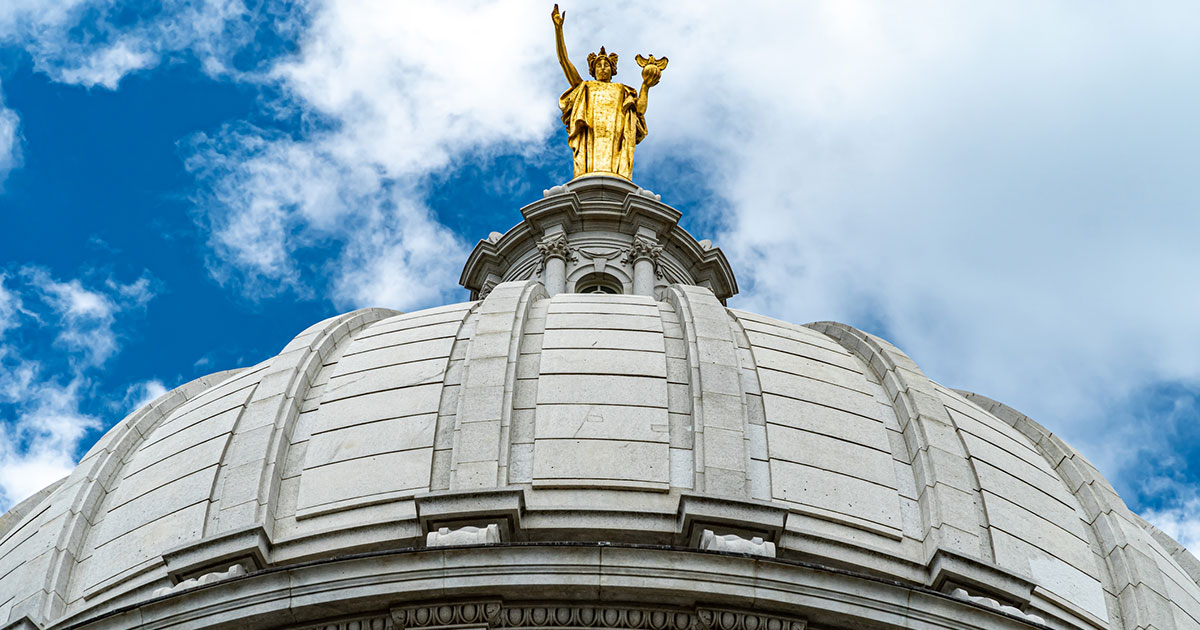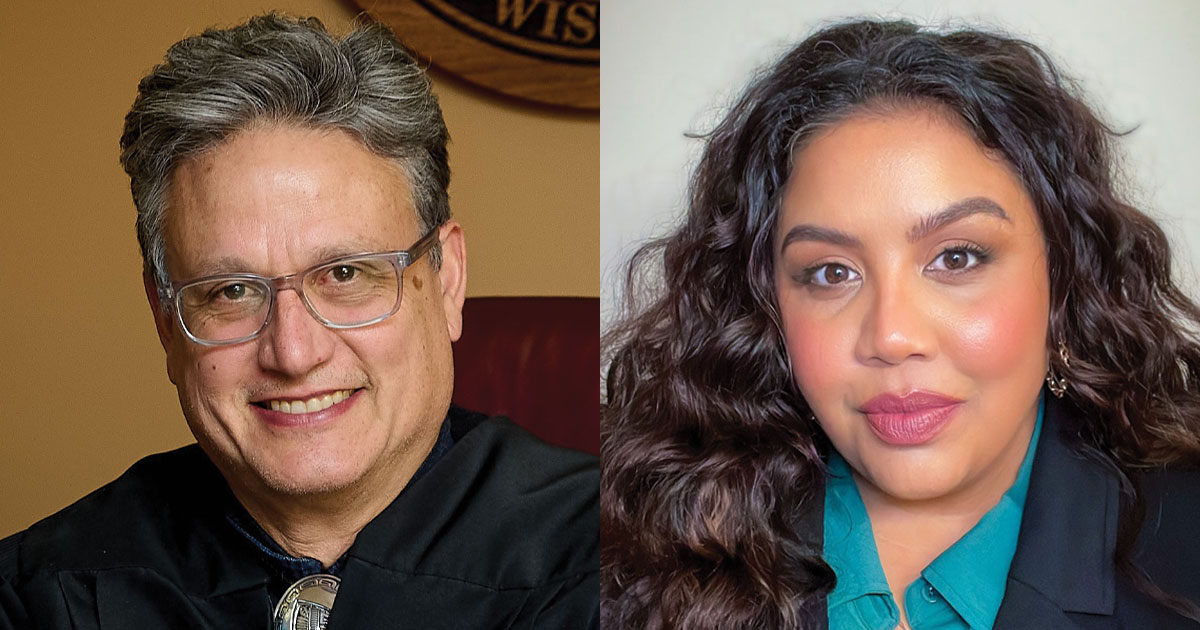
Wisconsin’s governors are typically remembered for their budgets, bill signings, and vetoes. But equally important are the individuals they appoint to the state’s 69 circuit courts, the Wisconsin Court of Appeals, and the Wisconsin Supreme Court.
Under article VII, section 9 of the Wisconsin Constitution, the governor has unfettered authority to make appointments to judicial vacancies.
Unlike Wisconsin, some states require a governor to fill judicial vacancies by choosing from a list of names forwarded by an official nomination commission. Iowa1 and Indiana2 are two examples.3
In two states, Virginia4 and South Carolina5, the legislature fills judicial vacancies. In Louisiana, special elections are held to fill judicial vacancies. In Illinois, the state supreme court makes appointments to fill judicial vacancies.
In Wisconsin, appointed judges serve until the next judicial election and then run in an election if they choose to continue in the position, under article VII, section 9, which states:
“When a vacancy occurs in the office of justice of the supreme court or judge of any court of record, the vacancy shall be filled by appointment by the governor, which shall continue until a successor is elected and qualified.”
To fulfill their obligations under article VII, section 9, Wisconsin governors have been relying on judicial selection advisory committees for at least 37 years.
Shortly after taking office in January 1987, Governor Tommy Thompson issued an executive order creating a judicial selection advisory committee. The next two governors, Governor Scott McCallum and Governor Jim Doyle, also relied on advisory
committees when making judicial appointments.
Present and Past Federal Court Appointments8
As of Dec. 31, 2023, President Joe Biden (since 2021) had appointed one U.S. Supreme Court justice (Ketanji Brown Jackson), 37 U.S. Court of Appeals judges, and 126 U.S. District Court judges. By comparison, former President Donald Trump appointed three U.S. Supreme Court justices, 54 U.S. Court of Appeals judges, and 174 U.S. District Court judges.
The most Supreme Court justice appointments were made by President George Washington (14 nominated; 10 confirmed and served); in the modern era (20th and 21st centuries), President Franklin Delano Roosevelt (1933-45) holds the record for most U.S. Supreme Court appointments: eight. President Ronald Reagan holds the record for most U.S. Court of Appeals appointments – 78, and appointed the most federal judges of all presidents – 402. President Bill Clinton holds the record for most U.S. District Court appointments – 305.
There is currently one vacancy on the U.S. District Court for the Eastern District of Wisconsin. On July 3, 2024, President Biden announced that he will nominate Byron Conway for the vacant seat. As of June 6, 2024, there were 46 vacancies in the federal district and appellate courts, with 17 pending nominees.
Walker Appointments
When Governor Scott Walker took office in January 2011, he appointed a judicial selection advisory committee made up of eight attorneys.
The committee was chaired by U.S. Court of Appeals for the Seventh Circuit Judge Michael Brennan, then a partner at Gass Weber Mullins.6 Brennan, who was appointed to the Seventh Circuit in 2018, served as a Milwaukee County Circuit Court judge from 2000 to 2008.
In 2016, a Walker spokesperson told the USA Today Network that Governor Walker used the following criteria when considering judicial applicants: 1) an outstanding attorney, 2) a man or woman of integrity, and 3) someone who understands the proper role of a judge.
Governor Walker appointed 101 judges during his two terms in office (2011-19). He appointed 91 circuit court judges, eight Wisconsin Court of Appeals judges, and two Wisconsin Supreme Court justices.7
William Curran, with Curran, Hollenbeck & Orton S.C. in Mauston, served on the Walker committee. Curran also served on Governor Thompson’s judicial selection advisory committee for 14 years, chairing it for 13 years. One difference Curran noticed when serving on Governor Walker’s committee was a reduced number of applicants.
“Governor Thompson was very proud of his judicial selections,” Curran said. “He had a lot of people applying for judgeships. I know [that] Governor Walker, and I suspect [that] Governor Doyle, had shallower pools.”
Curran said a big reason for the drop in the number of judicial applicants is that fewer lawyers are practicing in some parts of Wisconsin.

Mel Barnes, Governor Tony Evers’ chief legal counsel, serves as co-chair of Evers’ judicial advisory selection committee. She says the committee’s value comes from the diversity of its makeup.
Evers Appointments
Governor Tony Evers has appointed a 14-member judicial advisory selection committee. [See sidebar.] Mel Barnes, Evers’ chief legal counsel, and Benjamin Wagner, a shareholder at Habush Habush & Rottier in Milwaukee, serve as co-chairs.
The committee reviews applications, vets the applicants, and then interviews them. After interviewing the applicants, the committee recommends applicants for the governor to consider and interview.
Wagner said that Governor Evers uses three criteria when considering potential judicial appointments.
“Number one, he wants a humanist,” Wagner said. “A humanist is someone who has a good heart and is looking for the greater good, for public service. Number two, he wants a competent lawyer. And number three …. is a person who reflects the community in which they’re presiding over judicial proceedings.”
“Ultimately, the governor is looking to find and appoint someone who meets those criteria and understands the importance of the judicial role and upholding the rule of law throughout the state,” Wagner said.
Gov. Evers has appointed 60 judges during his five-and-a-half years in office. He’s appointed 54 circuit court judges and six Wisconsin Court of Appeals judges.
Two Judicial Firsts

Two of Governor Tony Evers’ judicial picks have made history.
Wisconsin Court of Appeals District I Judge Pedro Colón became the first Latino to serve on the court of appeals when he was appointed in 2023. Colón served as Milwaukee County Circuit Court judge for 13 years before his appointment to the court of appeals. Colón is also the first Latino to be elected to the Wisconsin Legislature; he served six terms in the State Assembly.
Rock County Circuit Court Judge Ashley Morse became the first woman of color to serve on the Rock County Circuit Court when she was appointed in 2022. Morse worked as an assistant state public defender for 12 years before her appointment to the bench.
Diversity of Practice Areas
According to Barnes, the committee’s real value comes from the diversity of its makeup.
 Jeff M. Brown, Willamette Univ. School of Law 1997, is a legal writer for the State Bar of Wisconsin, Madison. He can be reached by email or by phone at (608) 250-6126.
Jeff M. Brown, Willamette Univ. School of Law 1997, is a legal writer for the State Bar of Wisconsin, Madison. He can be reached by email or by phone at (608) 250-6126.
“We have a really diverse group of lawyers, in terms of practice areas, the number of years practicing, and geography,” Barnes said. “That really helps both in recruiting and interviewing the candidates, in asking relevant questions and getting to the core issues. The committee is a big help to the governor in recruiting and winnowing down the candidates.”
The diversity of practice areas is especially important when interviewing candidates, Barnes said.
“Some of the questions that, say, Benjamin could ask about personal injury, I wouldn’t have near the sense of what is relevant in that field and what the potential cases that a judge might see on the bench are,” Barnes said.
Barnes said that the committee works hard to spread the word about judicial vacancies, to attract a deep pool of candidates.
“We push it out widely, including with local bars and the State Bar’s listserv,” Barnes said. “We don’t want to miss out on a great candidate just because they’re not part of the connected network.”
The committee is a tight-knit group, Wagner said, and works hard.
“We don’t always see eye-to-eye, but we always try to reach a consensus and we usually do,” Wagner said. “It’s a lot of work but we all love doing it.”
Serving on Governor Evers’ judicial selection advisory committee has been an honor, Wagner said.
“It is one of the greatest privileges I’ve had as a lawyer,” Wagner said. “It’s a great public service and service to the governor and the people of Wisconsin to advise the governor on filling these vacancies.”

Benjamin Wagner, a shareholder at Habush Habush & Rottier in Milwaukee, also serves as co-chair of Governor Evers’ judicial advisory selection committee. He says the committee is a tight-knit group that works hard to reach a consensus.
Governor Evers’ Judicial Selection Advisory Committee
The following individuals were members of the Judicial Selection Advisory Committee as of June 1, 2024.
Mel Barnes, Chief Legal Counsel, Governor’s Office (co-chair)
Benjamin Wagner, Habush Habush & Rottier (co-chair)
Jeanne Armstrong, Fuhrman + Dodge S.C.
Christine Bremer Muggli, Bremer & Trollop S.C.
Michael Brose, Doar, Drill & Skow S.C.
Scott Brown, Deputy Corporation Counsel, Milwaukee County
Thomas Flugaur, retired Portage County Circuit Court judge
Kristen Hardy, Northwestern Mutual
Rebeca López, Godfrey & Kahn SC
Craig Mastantuono, Mastantuono Coffee & Thomas
Jon Padgham, Jon Padgham Law
John Raihala, Clifford & Raihala S.C.
John Sacia, Trempealeau County District Attorney
Katelyn Sandfort, Herrling Clark Law Firm Ltd.
Miriam Seifter, University of Wisconsin Law School
Endnotes
1 See Robin Opsahl,
Bill Advances Giving More Power to Governor in District Judge Nominations, Iowa Cap. Dispatch (Feb. 7, 2023),
https://iowacapitaldispatch.com/2023/02/07/bill-advances-giving-more-power-to-governor-in-district-judge-nominations/.
2 See Ind. Jud. Branch,
How Judges Are Selected in Indiana,
https://www.in.gov/courts/selection/ (last visited June 7, 2024).
3 See Ballotpedia,
Judicial Selection in the States,
https://ballotpedia.org/Judicial_selection_in_the_states (last visited June 7, 2024).
4 Commonwealth of Va., Div. of Legis. Servs.,
Judicial Selection Overview,
https://dls.virginia.gov/judicial.html (last visited June 7, 2024).
5 Ballotpedia,
Legislative Election of Judges,
https://ballotpedia.org/Legislative_election_of_judges (last visited June 7, 2024).
6 The firm changed its name to Gass Turek LLC in 2021.
7 Walker appointed Daniel Kelly to the Wisconsin Supreme Court in 2016, to serve out the term of Justice David Prosser, who retired. Kelly was defeated by Justice Jill Karofsky in the April 2020 election. Walker appointed Justice Rebecca Grassl Bradley to the supreme court in 2015, after Justice N. Patrick Crooks died in office. Justice Rebecca Grassl Bradley was then elected to the supreme court, defeating Court of Appeals Judge JoAnne Kloppenburg in the April 2016 election.
8 U.S. Cts.,
Judgeship Appointments by President,
https://www.uscourts.gov/sites/default/files/apptsbypres.pdf (last visited June 7, 2024). Appointments made by President Biden are as of Dec. 31, 2023.
» Cite this article:
97 Wis. Law. 34-37 (July/August 2024).
